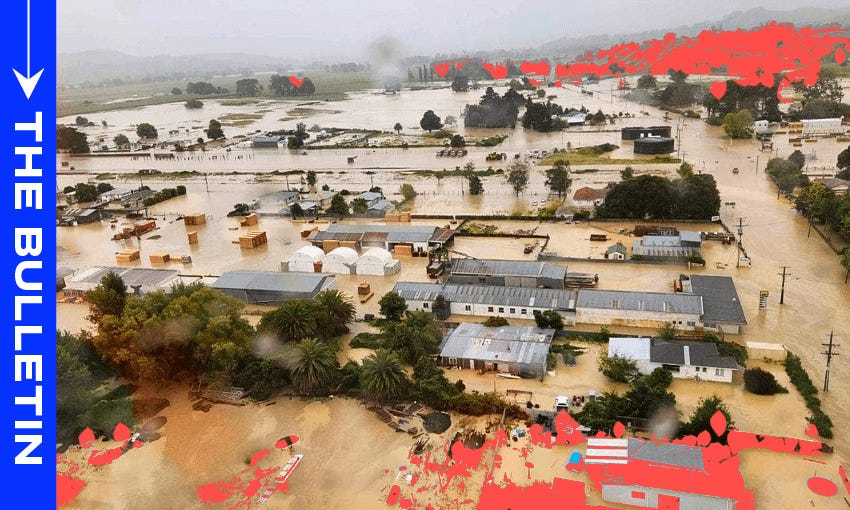Why Civil Defence was under-prepared and overwhelmed by Cyclone Gabrielle
A review of the Hawke's Bay cyclone response finds officials were hampered by communications failures, lack of data and 'the speed, severity and extent' of the disaster.
Mōrena, and welcome to The Bulletin for Tuesday, March 26, written by Catherine McGregor.
In today’s edition: Wrecking balls risk wrecking Wellington retail businesses ; Young families to get ECE fee support under government’s FamilyBoost policy; calls for a footpath ban after e-scooter-related injuries jump by 40%. But first, what a damning new report says about disaster preparedness and response in Hawke’s Bay.

Hawke’s Bay Civil Defence unable to cope, review says
Hawke's Bay Civil Defence Emergency Management (CDEM) officials were under-prepared for Cyclone Gabrielle, and overwhelmed by its speed and severity when it hit. Those are the topline findings of an independent review of Hawke's Bay's CDEM’s response to the cyclone made public on Monday. While officials did many things right, the review found that the region’s control centre "lacked situational awareness and intelligence about much of the danger and damage until too late" and as a result struggled to direct and coordinate first responders, partner agencies and volunteers. The review didn’t just focus on the local response. The national emergency management system “is not currently fit for purpose", says former police chief Mike Bush, who led the review. "It actually sets up good people to fail."
Local Civil Defence promises ‘a complete overhaul’
The 117-page review contains 75 recommendations – nine 'Tier 1' priority recommendations, and 66 in 'Tier 2', RNZ reports. Among the Tier 1 recommendations are that Hawke’s Bay CDEM should develop new regional disaster reduction and readiness plans, and push for central government to revamp the entire civil defence emergency management system. Hawke's Bay CDEM says it “fully accepts” the review’s findings, and is committed to doing the mahi needed. “To be clear, this is not about incremental change – we see this as a complete overhaul of how we approach emergency management in Hawke’s Bay,” the committee wrote. What they won’t do is sack those in charge last February, a decision that is infuriating some locals. "It's not satisfactory, you're there to protect us and you didn’t do that. End of story," one resident tells Newshub.
Reviews and reports, reports and reviews
If you’re confused by news of another Cyclone Gabrielle review, you’re not alone. At least 10 reports into the disaster have either been published or are underway, including the government’s formal Inquiry into the Response to the North Island Severe Weather Events, led by Sir Jerry Mateparae. That report is due to be delivered to emergency management minister Mark Mitchell today, however it’s not clear when it will be released to the public. Lianne Dalziel, who was elected mayor of Christchurch two years after the 2011 earthquake, writes in Newsroom that the various reviews all have one thing in common: a focus on emergency preparedness and response, rather than more systemic issues such as land use rules and the “business-as-usual activities of councils”, particularly those relating to the management of land drainage systems and infrastructure.
How long would your food supplies last in a natural disaster?
The many system failures and pressure points revealed by Cyclone Gabrielle include those affecting food distribution in a crisis. The Spinoff’s Shanti Mathias looks at how the cyclone has impacted food supplies and highlighted the urgent need for better food security policy.
“Let’s put it this way,” says researcher Jo Fountain. “If all the roads to your town were cut tomorrow, where would you go for food?”
To Fountain, writes Mathias, the question is an urgent one. Living in Lincoln, just outside of Christchurch, Fountain thinks frequently about what might happen if the alpine fault, along the spiny centre of the South Island, has an earthquake – and there is a 75% chance that will happen in the next 50 years. “The whole South Island will be in a state of chaos,” she says. “You can’t expect people to sweep in with food resources.”
Right now, we need your support more than ever
The Spinoff has estimated that the number of full-time journalists in New Zealand may have halved since 2018 Census data was published. As the media landscape continues to change, The Spinoff is not immune to the drastic advertising slowdown impacting the viability of media in this country. To those who already support us, thank you. If you don’t and are able, we’d be very grateful if you’d consider becoming a Spinoff member or donating today.
Duncan Greive
Founder
Young families to get ECE support – if they hold onto their invoices
Parents of young children will be able to claim a rebate of up to $75 a week to cover to partially cover childhood education (ECE) fees, the government has announced. Starting on July 1, FamilyBoost will reimburse 25% of fees to a maximum of $75 per week, calculated after the 20 Hours Free policy is taken into account and paid out quarterly via the MyIR web portal. Parents and caregivers will need a household income of under $140,000 to receive the full rebate, which will only be paid once ECE invoices are uploaded to MyIR. Finance minister Nicola Willis says FamilyBoost “will make it easier and more worthwhile for families with young children to work“ and that around 21,000 families will be eligible. The policy was part of National's pre-election promise of tax relief of up to $250 per fortnight for a family with children on the average household income of $120,000, explains Newshub. “However, Newshub revealed last year that only about 3000 households would actually receive the maximum overall tax cut.”
Wrecking balls risk wrecking Wellington retail businesses
As work starts to demolish Wellington’s Civic Administration Building this week, surrounding retailers are worried they’ll survive yet more disruption, The Post’s Tom Hunt reports. Demolishing the building, which is located between the still-shuttered library and town hall, will nearby businesses have had to suffer through three major projects in a row. Rhys Kaan, owner of Caffeinated Dragon Games opposite the library spends his working days “to the sound of jack hammers and other machinery at the library. At one point his shop was shaking.” Meanwhile the stretch of Wakefield St opposite the Civic Administration Building, once boutique retail, was now “virtually empty”, says the owner of a store that used to be located there there. Letting agent Johnny Curtis says all the works in the area had made it a “dead thoroughfare”.
Click and Collect
A 40% jump in e-scooter-related injuries has a pedestrian advocacy group calling for them to be banned from footpaths.
The Northland housing shortage is forcing the working poor to live in cars, cow sheds, teepees, and caravans without electricity or running water.
Dating app Grindr to offer free HIV self-test kits to New Zealand users.
A partial lunar eclipse will be visible tonight, but you’ll need keen eyes (and to know what you’re looking for) in order to spot it.
The UN Security Council has called for a ceasefire in Gaza for the first time, after the US abstained on the vote.
Feeling clever? Click here to play 1Q, Aotearoa’s newest, shortest daily quiz.
After years of false starts, Chris Hipkins just might be the one to make a wealth tax work for Labour, writes Max Rashbrooke. Wellington’s sorted housing. Now what are we doing about water, asks Jonny Osborne. Tara Ward has a drink with the greatest MAFS participant of all time. Gabi Lardies investigates how much trainees in our essential services get paid. Kate Evans fact-checks a persistent local myth about feijoas and iodine.
The Bulletin is looking for a sponsor
Expertly curated, The Bulletin delivers essential news and diverse perspectives from Aotearoa and beyond to business leaders, politicians, and decision-makers nationwide. Contact commercial@thespinoff.co.nz to learn more.
Got some feedback about The Bulletin, or anything in the news? Get in touch with me at thebulletin@thespinoff.co.nz.
If you liked what you read today, share The Bulletin with friends, family and colleagues.









Of course the civil defence preparation and therefore our (our national - everyone of us )failed in Gabriel. Of course we inevitably were not enough. Facing that tumultuous challenge - that assault by our damaged eco-system. How could we not fail. We failed. We are not bad. We were not sufficiently ready. Not fit for purpose. Our kiwi system of readiness has been shown to be wanting. That’s not to say thank you to all the volunteers and first responders who gave up weekends to practice and be ready. Who poured out and into action.
Our System was not fit. Not good enough - in
the event.
System has to be improved. But we are not fit to meet the events of the next ten to twenty five years. We should examine and act with all our rivers systems, reintroduce wet-lands at pace, undertake relocation from foreshore properties at risk of flood. Reconsider realities of agriculture with rising waters. Replant natives at a higher rate. Just for starters. But never forget the hundreds of heroes on the day who just got out stuck in with a spirit of helping, immediacy, spontaneity, even playfulness and some courage. All over the place people helped and saved neighbours. No way they failed. Our system was not up for it. “Room for improvement”!
The lunar eclipse was monday night :(